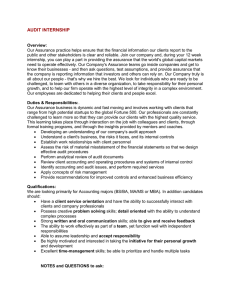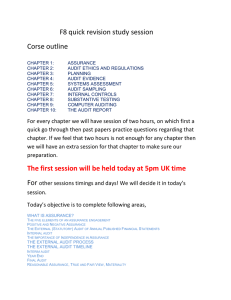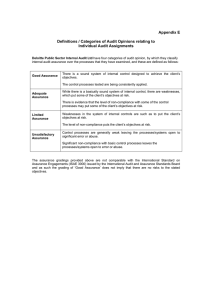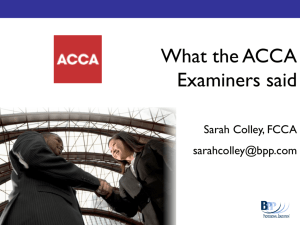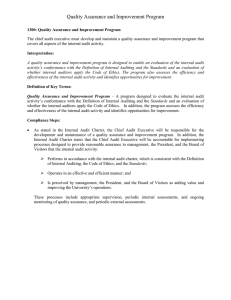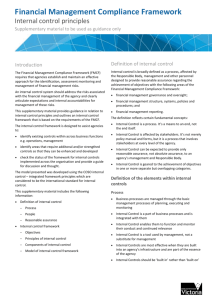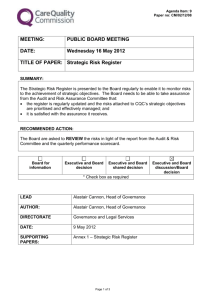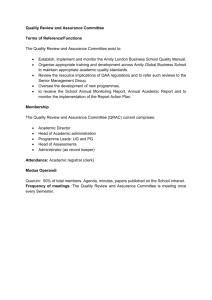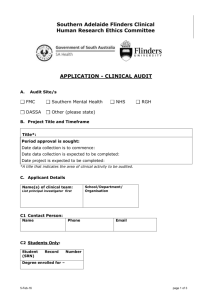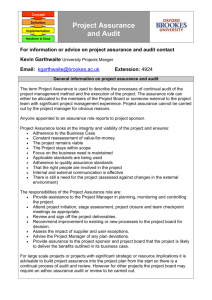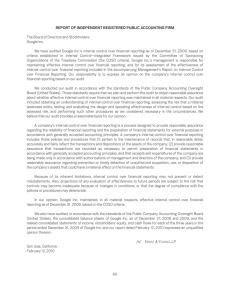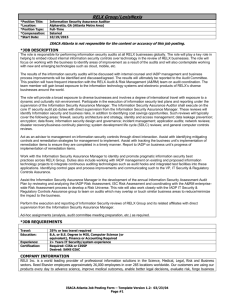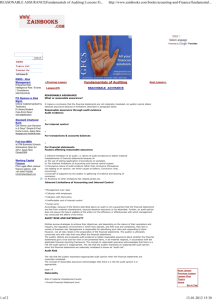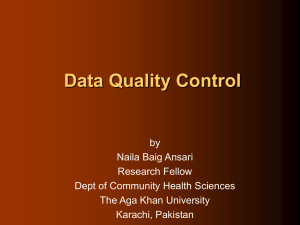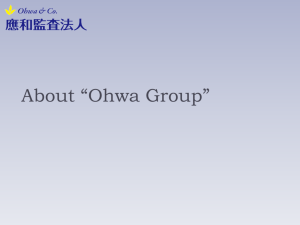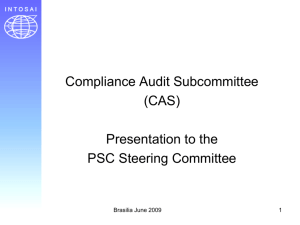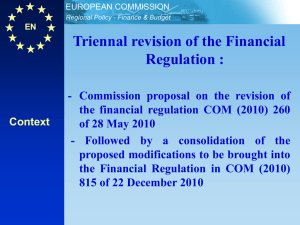Prof Jan Botha Key-note speaker
advertisement
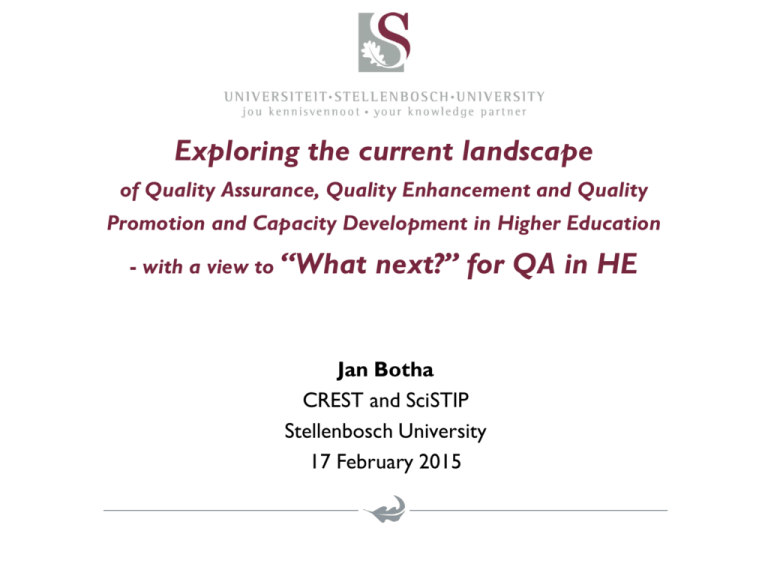
Exploring the current landscape of Quality Assurance, Quality Enhancement and Quality Promotion and Capacity Development in Higher Education - with a view to “What next?” for QA in HE Jan Botha CREST and SciSTIP Stellenbosch University 17 February 2015 Outline Considering QA in Higher Education: 1. Where do we come from? 2. Where are we now? 3. Where do we want to be? 4. How do we get there? 2 The Times They Are a-Changing (Dylan) Come gather 'round people Wherever you roam And admit that the waters Around you have grown And accept it that soon You'll be drenched to the bone. If your time to you Is worth savin' Then you better start swimmin' Or you'll sink like a stone For the times they are a-changin'. 3 Come writers and critics Who prophesize with your pen And keep your eyes wide The chance won't come again And don't speak too soon For the wheel's still in spin And there's no tellin' who That it's namin'. For the loser now Will be later to win For the times they are a-changin'. The 80/20 Principle Effort Results R Koch 2007. The 80/20 principle. The secret of achieving more with less. London: N Breadly Publishing 4 Self-evident truths… 1. Knowledge production and science are beneficial to society. 2. A university education ensures a happier and more meaningful life. 3. Applying business principles and the management practices of the private sector and commercial companies in higher education institutions is necessary. 4. The academic side of universities and the support services side are incommensurable, underpinned by different logics. 5. Quality assurance is a cause of quality: efficient quality assurance enhances the quality of research, teaching & learning, and community engagement. 6. Quality assurance consists (at minimum) of self-evaluation and peer review. 7. Active learning is better than lectures. 8. Successful universities have dedicated quality assurance units 5 The Audit Society Michael Power (1997) • Accountability and account giving is part of being a rational human being, it sustains normal human exchange • Trust releases us from the need for checking • Can we imagine a society where nothing is trusted? • Can we imagine society without checking at all? • During 1980s and 1990s --- an “audit explosion” • • • • • • Financial audit Environmental audit Management audit Value for money (VFM) audit Medical audit Teaching Quality Audits and Research Assessment Exercise (RAE) • “Managerial audit colonization” vs. “resistance/decoupling” 6 7 Fifteen years of quality in Higher Education. Lee Harvey & James Williams (2010) • What have we learned from 15 years of journal articles on external QA? • What have we learned from 15 years of journal articles on internal QA practices? 8 Twenty Years of Quality Assurance in Higher Education: What’s Happened and What’s Different? Peter Ewell (2010) What has happened? • Steadily increasing focus on student learning • Transformed modalities of teaching and learning • Quality assurance is becoming trans-national What is different? • Documentation and intentionality • Focus on teaching • Transparency and public perception 9 What next for QA? Harvey & Newton (2004) • to refocus and re-orientate it to the actual improvement of teaching and learning • to rebalance regulation for accountability and quality enhancement • to link quality evaluation more explicitly to learning • to prioritise improvement of the student learning experience as the main demonstrable goal over making institutional quality-assurance measures ever more efficient • the need for more reflection and research-based evidence to inform evaluation • to make academics central to enhancement-led evaluation; • and to connect external and internal evaluation processes in ways that add real value to the latter. 10 What next for QA? Barnett (1994, p. 165) •View quality evaluations as a ‘form of enlightenment’ which deepens the selfunderstanding of academics, rather than as a mechanism of ‘state surveillance’ 11 How do we get there? More reflection and research-based evidence to inform evaluation Conceptualise QA as primarily a research endeavour and not a management tool (The QEP approach) Emphasise academic values Take hands with “them,” (i.e. the academics) Put World One on hold (for a while) and work in World 2 12 The Three-worlds Framework WORLD 3: WORLD OF METASCIENCE Philosophy and history of science, research ethics, sociology of science, research methodology WORLD 2: WORLD OF SCIENCE Theories, models, typologies. Concepts and definitions. Findings, data. Instruments, scales, questionnaires. RESEARCH PROCESS PROBLEM - DESIGN - METHODOLOGY - CONCLUSIONS WORLD 1: EVERYDAY LIFE Social world: individual human beings; actions and events, organisations, institutions, interventions, collectives and social objects Physical world: plants, animals, atomic and subatomic particles 13 Max Bergman’s “dynamically adjusting research model” Research Question Analysis Data Results Partial Provisional “Postcard exercise”: WHAT are we going to do? What is the problem? What is the unit of analysis (the phenomenon) WHY is it important to do this? The rationale / reason / motivation HOW are we going to do this? What data do we need? Where and how will we find it? How will we analyse it? 15 Learning analytics “A brave new world: Student surveillance in Higher Education” (Prinsloo 2014) •Students digital lives are but a small part of a bigger whole, but our claims pretend as if this minute part represents the whole •We create smoke and claim we see a fire •We seldom wonder what if our algorithms are wrong, and what the long-term implications for our students are 16
